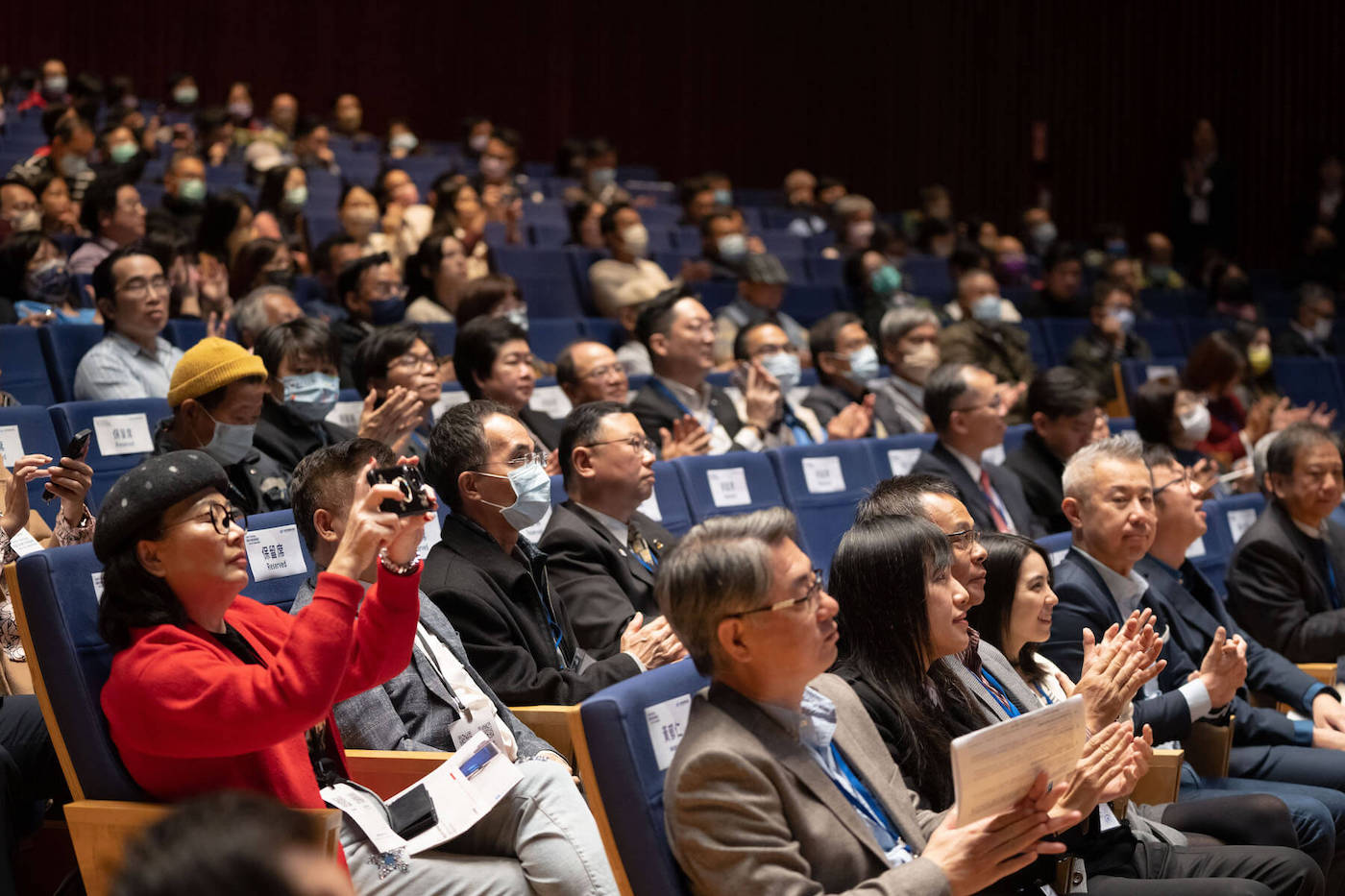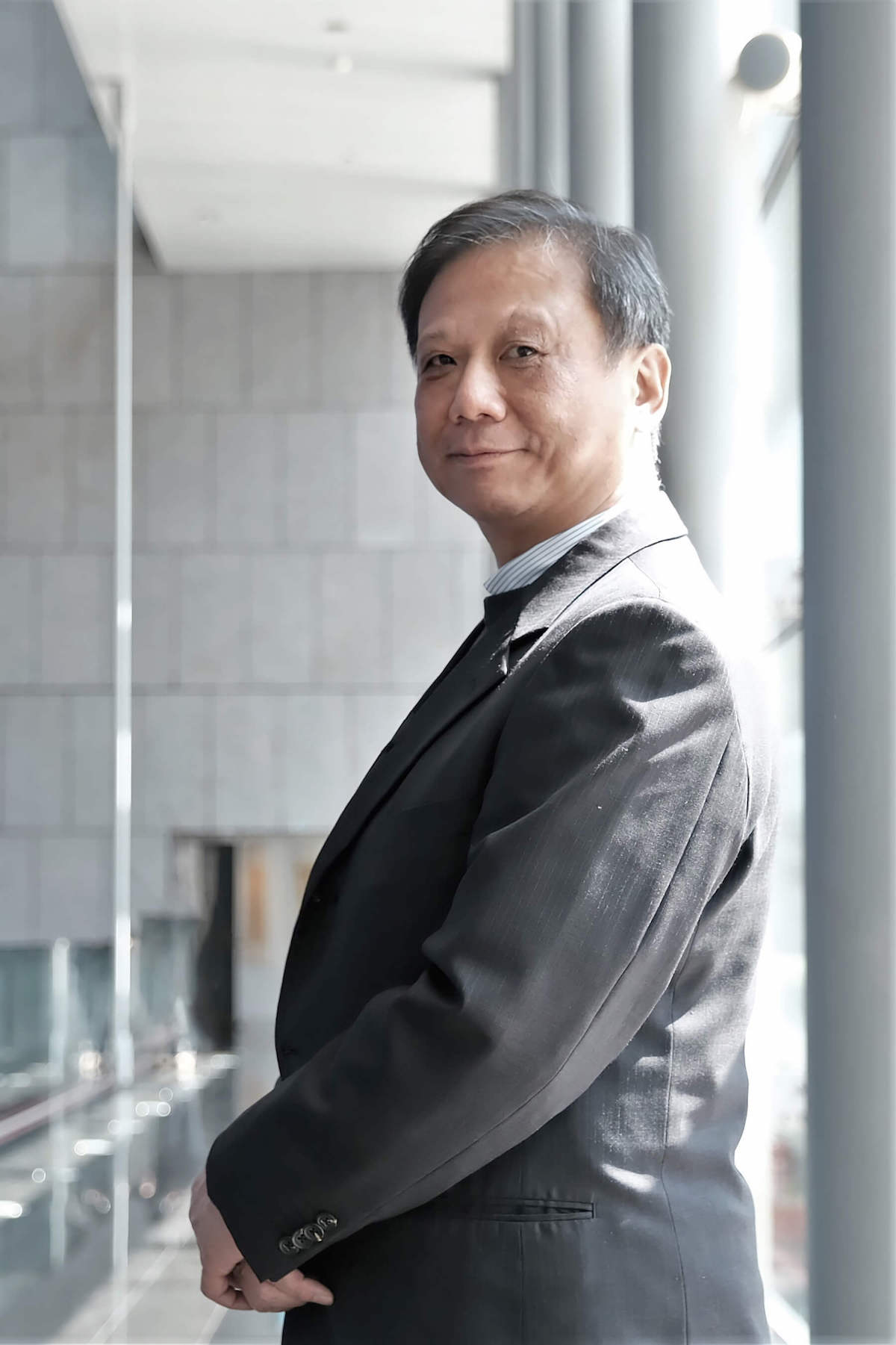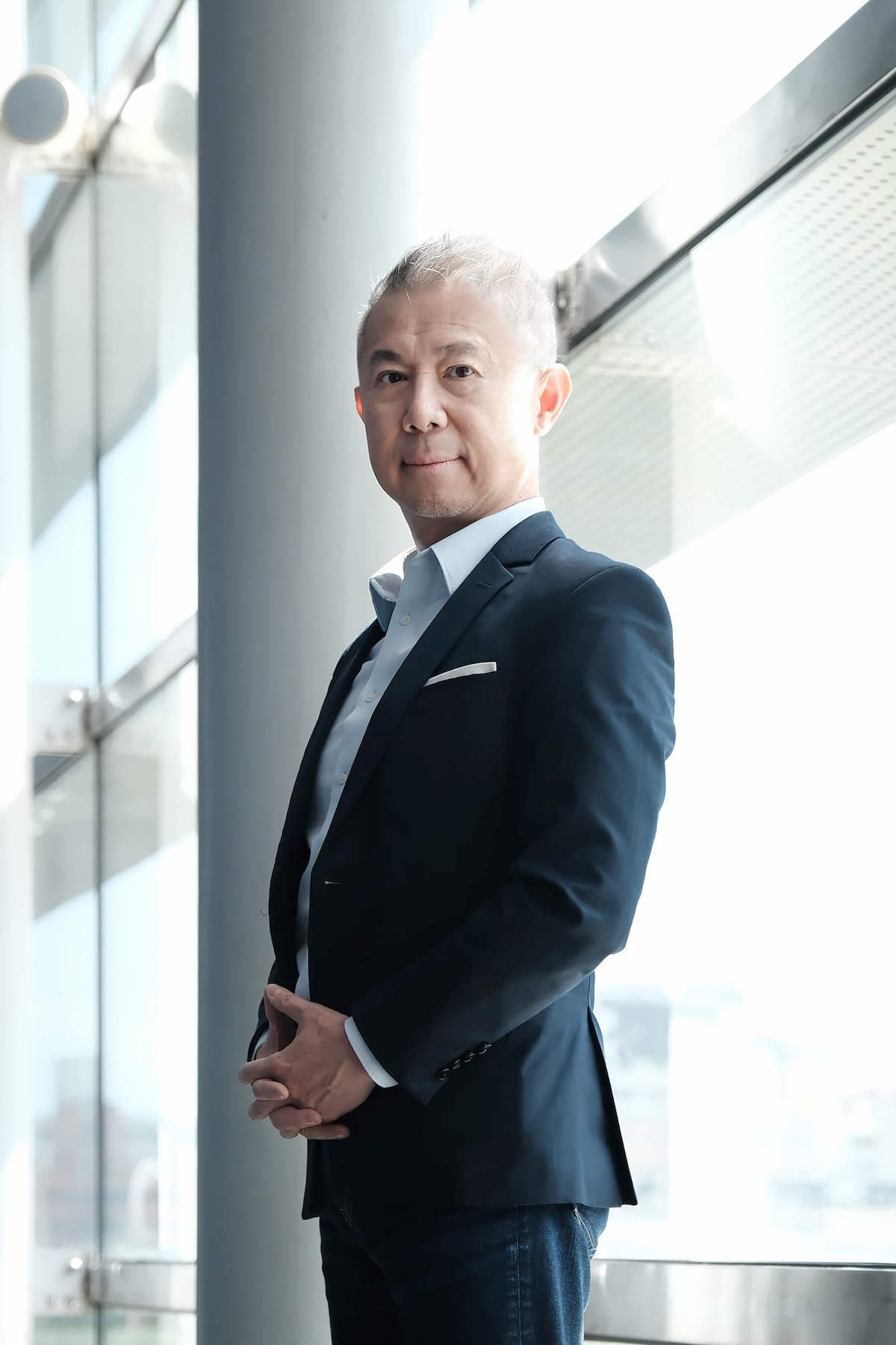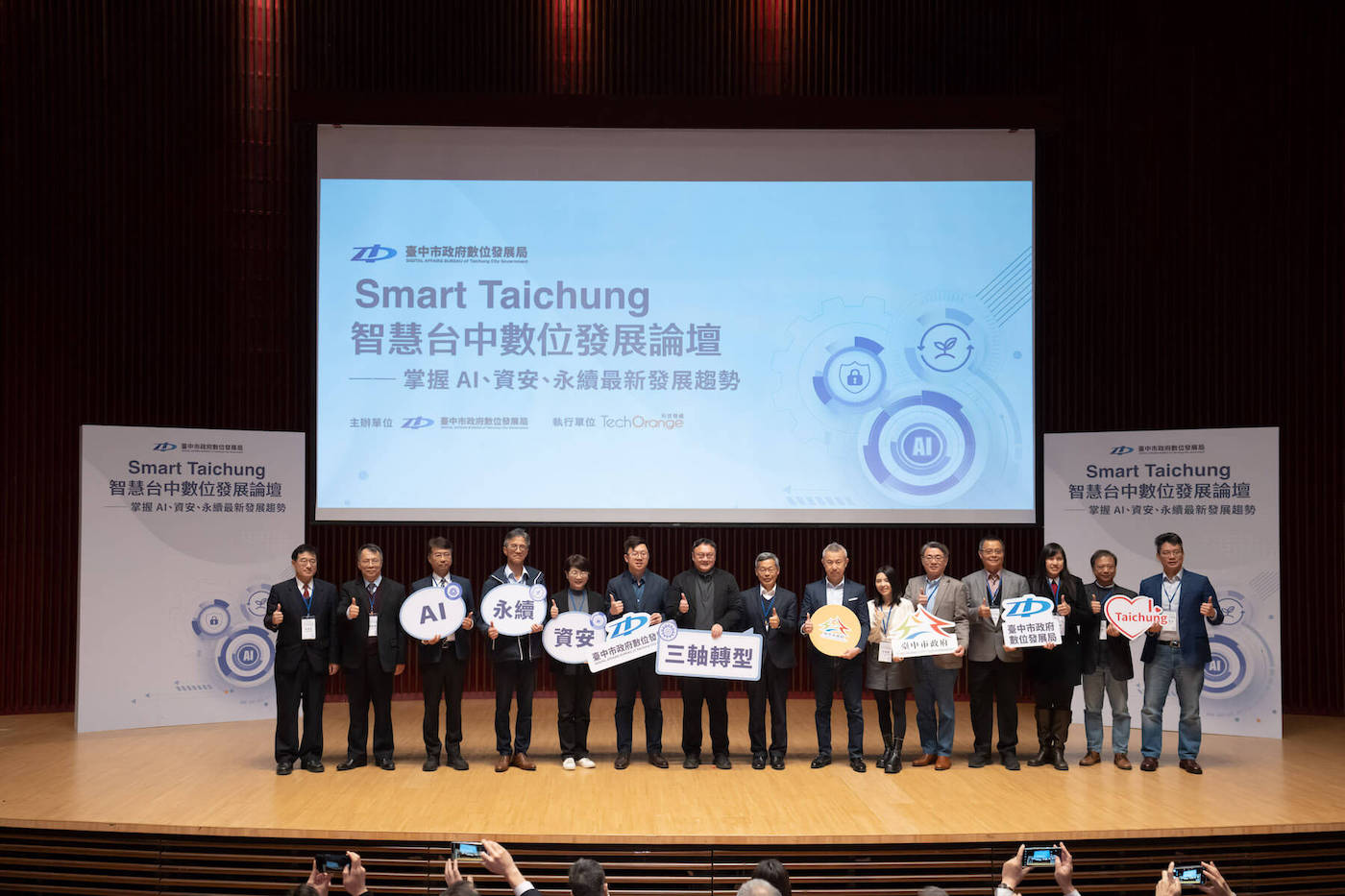智慧時代的底層邏輯——Smart Taichung智慧台中數位發展論壇
探索AI、資安與智慧城市!「Smart Taichung智慧台中數位發展論壇」揭示科技如何影響城市未來,攜手打造更安全、高效、永續的數位生活。
在數位浪潮席捲全球的時代,AI技術迅速崛起,影響人們的學習、工作與城市治理。首屆「Smart Taichung智慧台中數位發展論壇」聚焦人工智慧、資安挑戰與永續發展,邀請臺灣與國際專家剖析數位轉型的關鍵議題。文章涵蓋臺大陳縕儂教授對生成式AI的影響解析、鴻海研究院李維斌執行長對AI資安與應用的觀察,以及新加坡國立大學副校長陳祖翰分享的新加坡經驗,對比臺灣地方政府的數位發展優勢。從技術進步到政策制定,論壇帶來深刻的思考,幫助我們理解AI時代如何重塑城市與生活,適合關心科技發展、數位治理與智慧城市未來的讀者參考。
長期積累發展的AI技術,在生成式AI的問世後,乍然一躍而上成為焦點在世代間震盪。2023年英國柯林斯詞典(Collins Dictionary)和英國經濟學人雜誌(The Economist)的第一名年度單字分別是「AI」與「ChatGPT」。
面對摸不到勾不著的科技發展,有些人惴惴不安,試圖在快速發展的科技中尋找人類存在的價值意義;也有人憂心資訊安全與未來發展的方向。在飄渺的數位轉型中,現行體系該如何跟上腳步?
臺中市數位治理局2025年更名為數位發展局後,以更前瞻性的思維探討數位科技對人民與城市的角色,首屆「Smart Taichung智慧台中數位發展論壇」應運而生,深入探討AI、資安與永續議題。

學習、工作,人類的新朋友上線
國立臺灣大學資工系教授陳縕儂帶著大家深入淺出的了解生成式AI帶來的意義。往昔,資訊的傳遞與記載多半仰賴人類記憶力,但隨著網際網路問世,資訊傳輸的成本降低,記憶力為強項的人優勢也跟著降低,如今科技同樣帶來新的變化。
陳縕儂以美國教育心理學家布盧姆的學習金字塔,解說生成式AI帶來的改變。學習至實踐的階段,依序從低階思維能力到高階思維能力,記憶、理解、應用、分析、評估、創造,而生成式AI經過大量的資料搜集、數據模擬,能夠進一步做到高階思維能力,讓認知與分析的成本降低,「工具進步,人類需要的能力隨之改變。」如何活用AI成了新課題。
多了一個大腦提供生產力,許多工作事務看似輕鬆了不少,然而,不同平台與大數據背景可能帶來偏頗的結果,每個國家的國情、文化與語言的約定俗成皆會產生差異,亦會影響解答的方向。在臺灣,也有一群人為了更貼近在地做努力,陳縕儂帶領臺大資工系的林彥廷博士領導的團隊開發了以繁體中文與臺灣文化為核心的大型語言模型 Taiwan-LLM(Taiwan Large Language Model),專門針對臺灣文化、法律和時事進行深度理解,為臺灣的AI產業做出貢獻。
在探討人與AI的關係時,陳縕儂以輕鬆的語氣形容AI的角色,她笑著說:「它是一起Brainstorming(腦力激盪)的好對象!」這句話消除了人們對AI的陌生感,也呈現出人與科技之間的互助關係。作為使用者,我們能夠決定AI的方向與價值,善用工具攜手思考協作,「AI不會取代人類,但使用AI的人會取代不用AI的人。」

站上基石,與夥伴共構
鴻海研究院執行長李維斌闡述AI發展帶來無限可能,但同時伴隨風險,且資安的挑戰更是無處不在。我們該如何在這場科技變革的競賽中取得平衡,確保技術真正服務於市民,成為一大課題。
首先,企業與組織在面對AI等新興科技的迅速演進,容易陷入盲目追隨的陷阱,忽略了AI的本質、侷限,以及導入時組織慣性、文化、流程改造與技術門檻等問題,導致許多計畫啟動後發現難以落地,最後無疾而終。任何科技都有興起到成熟的過程,企業與政府應從適當的時機介入。更重要的是,我們要思考「AI到底要解決什麼問題?」才能真正讓AI賦能,提升市民生活品質。
在AI的應用上,數據品質也決定其成效,只有大數據是不夠的,還需要有價值、高品質的資料,最終才能形成適合AI應用的(AI-ready Data)。然而,許多組織數據過去長期累積下來,可能存在偏差(Bias),如果缺乏多元的數據源,AI決策可能也會產生預期外的結果。因此,數據治理也變得至關重要。
李維斌進一步分享,AI的發展最終都朝向永續目標,確保技術真正服務於人民,而非僅為追求新科技而數位化。「當我們使用 AI時,就像開車一樣。」開車時,得先確認車子的安全性,如同使用AI時要審視資安標準、倫理規範、資料來源與是否有維護模型的能力,而駕駛中需要握住方向盤、控制車速並清楚目的地,才能順利到達終點。同樣地,AI不能只是高速發展,還需要有明確的目標與調控機制。
在這場AI變革的棋局中,我們究竟是在下棋,還是在拼圖?唯有在戰略上深思熟慮,將技術應用於真正的市民需求,發揮科技價值,才能讓智慧城市走向永續發展。

國際視野下的在地實踐
新加坡國立大學副校長陳祖翰作為特邀貴賓,先是靦腆的誇讚臺中人的熱情,接著目光很快地來到多年來在海外乃至全球視野的觀察。新加坡在人工智慧領域起步較早,2014年新加坡總理宣布建設「智慧國」,展現將數位應用於治理的雄心。2017年政府資助「AI Singapore」計畫致力於AI研究與人才培育,迄今已培養百位人才,持續投注AI研究,透過數據開放、政府主導科技發展方向,吸引企業合作,實踐於基礎建設、數據與政策等,新加坡對於AI人才的培育與治理值得借鏡。
陳祖翰也大方分享,新加坡在全球AI指數排名中名列第三,但是對於是否要成為全球AI領導者,新加坡更傾向於發展符合自身特色的AI技術與應用,而非盲目追求全球第一。
相比之下,臺灣的地方政府在AI部署也有獨特優勢,因為治理場域與民眾的生活更密切,更能深入也切合民眾的需求,來發展地方特色的AI應用。而新加坡是眾所皆知的城市國家,因此在AI部署上與一般的國家有所不同。從切合民眾需求的角度來看,「地方政府在執行上和人民接觸得很好,臺灣也許從臺中市開始,逐漸發展出臺灣具有地方特色的AI技術與應用。」

The Underlying Logic of the Intelligent Era - Smart Taichung Digital Development Forum
With the rise of generative AI, artificial intelligence has become a defining force of our era. Recognized as the top words of 2023 by Collins Dictionary and The Economist, “AI” and “ChatGPT” reflect both excitement and anxiety over technological advancements. While some seek meaning in this digital transformation, others worry about security and its future direction.
In response, Taichung City’s Bureau of Digital Development—renamed in 2025—launched the Smart Taichung Digital Development Forum to explore AI, cybersecurity, and sustainability.
AI as a New Ally in Learning and Work
Professor Chen Yun-Nung from NTU explains how generative AI reshapes learning and work. Once, memory was a key advantage, but as technology evolves, so do the skills humans need. Using Bloom’s Taxonomy, she illustrates how AI reduces cognitive costs by advancing higher-order thinking.
While AI boosts productivity, biases in data and cultural contexts affect its accuracy. To address this, Chen and Dr. Lin Yen-Ting’s team developed Taiwan-LLM(Taiwan Large Language Model), a language model designed for Taiwan’s legal and cultural landscape.
Viewing AI as a collaborator, Chen remarks, “It’s a great brainstorming partner!” She emphasizes that AI’s value depends on human guidance: “AI won’t replace people, but those who use AI will replace those who don’t.”
Standing on the Foundation, Building Together with Partners
Wei-Bin Lee, Chief Information Security Officer at Hon Hai Technology Group (Foxconn) highlights AI’s vast potential but warns of its risks, especially cybersecurity challenges. The key issue is how to balance technological advancement while ensuring AI serves citizens effectively.
Many organizations blindly follow AI trends without considering its limitations, cultural barriers, and technical hurdles, leading to failed implementations. AI must address real problems to enhance quality of life. Data quality is also critical—biased or insufficiently diverse data can lead to flawed AI decisions, making data governance essential.
Lee emphasizes that AI should prioritize sustainability over mere digitalization. Like driving a car, AI requires security checks, ethical oversight, and clear objectives. Without strategic planning and regulatory control, rapid AI development risks becoming aimless. Ultimately, the true challenge is not just advancing AI but ensuring its responsible and meaningful integration into society.
Local Implementation with a Global Vision
Vice President of the National University of Singapore, Professor Chen Zu-Han, praised Taichung’s warmth before sharing insights on AI development. Singapore took an early lead in AI, launching the "Smart Nation" initiative in 2014 and funding "AI Singapore" in 2017 to drive research and talent cultivation. With open data policies and government-led innovation, AI is integrated into infrastructure and policymaking. While Singapore ranks third in the Global AI Index, it focuses on developing AI suited to its needs rather than pursuing global leadership.
In contrast, Taiwan’s local governments, closely connected to citizens' daily lives, have an advantage in AI deployment by tailoring applications to local needs. Singapore, as a city-state, approaches AI differently from larger nations. From a citizen-centric perspective, “Local governments engage closely with the public. Taiwan, perhaps starting with Taichung, may gradually develop AI technologies and applications with distinct local characteristics.”
文章參考ChatGPT翻譯|Translation assisted by ChatGPT.
